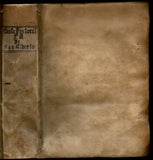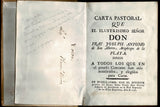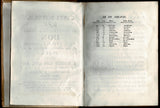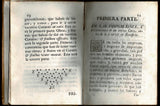Carta Pastoral que el ilustrísimo Señor don Fray Joseph Antonio de San Alberto, Arzobispo de la Plata, dirige a todos los que en el pasado Concurso han sido nombrados, y elegidos para Curas
Author: José Antonio De San Alberto (1727-1804)
Year: 1791
Publisher: Real Imprenta de los Niños Expositos
Place: Buenos Aires
Description:
[4]+676 pages with errata f after title, signature 4H duplicated. Small quarto (8 x 5 3/4") bound in later limp vellum with lettering to spine.
(Furlong II, 367; Gutierrez 54; Medina 130; Palau 289494;Sabin 75976) First edition.
San Alberto entered the Discalced Carmelites of Aragon at an early age, taught for many years in Huesca and Calatayud, and filled a number of administrative positions in the order. Made bishop of Córdoba in Tucumán, he took charge of his diocese in 1778; in 1786 he was in charge of the Archdiocese of La Plata (now Sucre, in Bolivia). His letters, printed in Colección de instrucciones pastorales (Madrid 1786), indicate his pastoral knowledge. The letter written to the pastors of Córdoba in 1778 began with an explanation of the biblical and historical ecclesiastical origins of the parish ministry, emphasizing its dignity and its duties. He warned the faithful against mere ritualism and urged them toward inner sanctity. Another pastoral referred to the orphanages founded in Córdoba, insisting upon catechetical instruction in them. In a pastoral to the pastors of La Plata, he preached their obligation to reside in their parishes and warned them against avarice. San Alberto also played a role in bringing about the enlightened reform of the curriculum in the University of Córdoba.
The best known of his works is the Catecismo real (Madrid 1786) on the obligations of vassals to the king, written in the form of questions and answers. This formulation of the Gallican doctrine of the divine right of kings, following the model of Bossuet, affirms the total independence of the kings in the temporal sphere: responsibility only before God, absolute power limited only by the moral law, right of patronage, the illicitness of all resistance on the part of the vassals, the duty of not only external but also internal obedience. It is one of the most important works enunciating the Gallican doctrine of royal power in Hispanic America, a doctrine that dominated the second half of the 18th century and the first decade of the 19th.
Condition:
Ties lacking, some separation of vellum to spine, corners bumped, old ink inscription to front end paper else very good.













